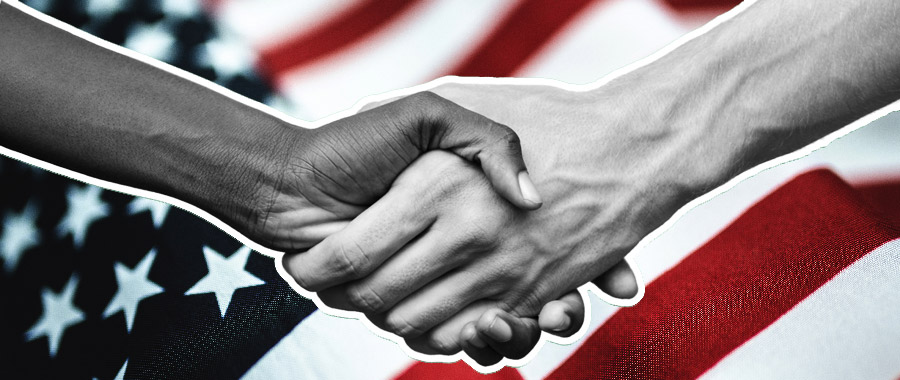In an era marked by sociopolitical upheaval and increasing polarization, the Bahá’í teachings serve as a beacon of hope and guidance in addressing one of humanity’s most insidious afflictions: racism. The notion of finding courage to confront and eradicate this disease is not merely a call to action; it is an existential challenge that begs introspection and communal collaboration. How do we, as a society, muster the fortitude to engage with this pervasive and destructive force? This inquiry invites us to explore the philosophical underpinnings, personal responsibilities, and collective actions inspired by Bahá’í principles.
The Bahá’í Faith posits that racism is fundamentally a spiritual disease, one that undermines the fabric of society and stifles human potential. Understanding this assertion requires an exploration of the innate oneness of humanity. Bahá’í teachings assert that all individuals, regardless of race, ethnicity, or background, are created equal and are possessors of an inherent divine potential. To embrace this fundamental truth is to begin the journey of dismantling racism in all its forms.
The essence of Bahá’í teachings revolves around the understanding that each person must cultivate their own spiritual and moral character. This involves recognizing and confronting ingrained prejudices within oneself. The first step in this courageous journey is self-examination. Ask yourself: What biases do I hold? Are these biases informed by societal conditioning, or do they stem from personal experiences? Such reflections can be daunting. However, they are a prerequisite for transforming individual attitudes into broader societal change.
Furthermore, the role of education cannot be overstated. Bahá’í teachings emphasize the importance of knowledge and understanding in combating ignorance, which often fuels racism. Are we prepared to educate ourselves about the histories and cultures of marginalized groups? Education must extend beyond academic concepts; it should encompass emotional intelligence and empathy, fostering genuine connections among diverse communities. In this context, learning becomes a powerful antidote to the ennui of apathy and prejudice.
Having recognized our own internal struggles, we must then turn our gaze outward. How can we contribute to our communities in ways that promote inclusivity and equality? The Bahá’í principle of community building urges individuals to engage in collaborative efforts aimed at fostering unity among diverse populations. Initiatives might include organizing interfaith dialogues, cultural events, or workshops that encourage the examination of racial biases. Through these platforms, individuals can share experiences and cultivate a deeper appreciation for one another’s humanity.
However, while striving for communal harmony, it is imperative to approach conversations around racism with both sensitivity and courage. This is where the challenge becomes intricate. How do we navigate the discomfort that often accompanies discussions of race? The Bahá’í teachings recommend adopting an attitude of humility and openness. Acknowledging one’s own limitations and mistakes helps to create a safe space for honest dialogue. In this milieu, participants may be more willing to share their perspectives and experiences without fear of judgment.
Moreover, the Bahá’í Faith emphasizes the significance of action in conjunction with contemplation. Engaging with racism requires us not only to think deeply about these issues but also to take concrete steps to address them. Establishing alliances with organizations dedicated to social justice can amplify our individual efforts. Partnering with entities that bolster education, advocacy, and policy reform creates a collective force capable of challenging systemic racism more effectively than any solitary action could. This approach promotes the understanding that addressing racism is a shared responsibility, transcending personal or institutional boundaries.
The Bahá’í concept of consultation also plays a crucial role in addressing the challenges posed by racism. Consultation, as prescribed by Bahá’í teachings, urges individuals to engage in collective decision-making processes, valuing each participant’s voice. This democratic approach can yield innovative solutions to combat prejudice and promote inclusivity. When members of diverse backgrounds come together to consult, they bring unique perspectives that enrich the conversation, allowing for a deeper understanding of the complexities of racism.
Moreover, the concept of service is integral to the Bahá’í teachings. Service to humanity, particularly to those suffering the effects of discrimination and prejudice, offers a profound way to demonstrate commitment to eradicating racism. Acts of kindness, advocacy for policy changes, and support for individuals facing inequality are all manifestations of service that can pave the way for greater societal transformation. The question arises: Are we willing to serve beyond the confines of our comfort zones? This willingness forms the cornerstone of true courage in tackling the disease of racism.
In summation, the Bahá’í teachings inspire individuals and communities to confront the existential challenge of racism with both courage and compassion. Through self-examination, education, community engagement, and collective action, the disease of racism can be treated and ultimately eradicated. This call to action transcends mere rhetoric; it is a moral imperative requiring the collective efforts of all of humanity. As we embark on this journey, let us continually ask ourselves: How can we, in our unique spheres of influence, embody the principles of unity, justice, and love that lie at the heart of Bahá’í teachings? The answers may illuminate the path toward a more just and equitable world.
